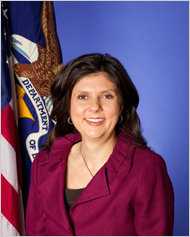Betsey Stevenson
| Betsey Stevenson | |
|---|---|
 | |
| Chief Economist U.S. Department of Labor | |
| In office September 2010 – September 2011 | |
| President | Barack Obama |
| Preceded by | Alex Mas |
| Succeeded by | Adriana Kugler |
| Personal details | |
| Political party | Democratic Party |
| Alma mater | Wellesley College (B.A.) Harvard University (M.A. and Ph.D.) |
| Website | users.nber.org/~bstevens/ |
Betsey Ayer Stevenson is an economist and Associate Professor of Public Policy at the University of Michigan Gerald R. Ford School of Public Policy.[1] The Obama Administration announced her appointment to the Council of Economic Advisors, a post she assumed in the summer of 2013.[2] She previously served as Chief Economist of the U.S. Department of Labor under Secretary Hilda Solis.[3] Previously, she was an Assistant Professor of Business and Public Policy, at the Wharton School of the University of Pennsylvania.[4]
Education
Betsey Stevenson earned a B.A. in economics and mathematics from Wellesley College in 1993. After working as a research assistant at the Federal Reserve, she went on to earn an M.A. and Ph.D. in economics from Harvard University in 2001. At Harvard, she studied under N. Gregory Mankiw, and had Caroline M. Hoxby, Lawrence Katz, and Claudia Goldin as thesis advisors.[5]
Current academic appointments
Currently, Stevenson serves as a Research Associate at the National Bureau of Economic Research, which she has been affiliated with since 2008.[6] She has been on the Board of Directors of the American Law and Economics Association since 2010.
In 2011, Stevenson was appointed to the Brookings Institution's, Brookings Papers on Economic Activity as an Advisor. Also in 2011, Stevenson joined the Editorial Board of the International Journal of Happiness and Development.
Since 2007, Stevenson has served as a research fellow for the CESifo Economic Studies.
Stevenson maintains a large twitter following and regularly provides economic analysis on cable television.[7]
Past professional and academic appointments
After graduating from Harvard, Stevenson turned down a faculty position at the University of Michigan and went to work for Forrester Research, a technology consulting firm in California. After a few years, she accepted a faculty position at the Wharton School of the University of Pennsylvania in 2004. In addition, from 2005–2009 she served as a Visiting Scholar at the Federal Reserve Bank in Philadelphia and San Francisco.
From September 2010 to 2011, she served as Chief Economist of the U.S. Department of Labor under Secretary Hilda Solis.
After leaving the Department of Labor she spent a year as a Visiting Assistant Professor and Visiting Associate Research Scholar at the Princeton University Department of Economics. Stevenson then moved to Gerald R. Ford School of Public Policy at the University of Michigan.[1]
Academic Research
Stevenson has published widely in leading economics journals about the impact of public policies on the labor market, with a focus on women and families. She has also written widely on subjective well-being. Her research is interdisciplinary, and her research had an impact in economics, sociology, psychology, and demography, and within legal scholarship. She is a columnist for Bloomberg View, and a sometime commentator for Public Radio’s Marketplace program, and her thoughts on the economy are frequently covered in both print and television media.[8]
Stevenson's research is extensive, including several papers co-authored with Justin Wolfers.
Personal life
Betsey Stevenson has two children with Justin Wolfers, an Australian economist and public policy scholar, who is also a professor of economics and public policy at the University of Michigan. The couple met while graduate students at Harvard University.[5] They are unmarried partners for tax reasons,[2] and have frequently publicly discussed being a Shared Earning/Shared Parenting relationship.
References
- ↑ 1.0 1.1 "Much-Watched Couple in Economics Lands at U. of Michigan". The Chronicle of Higher Education. 30 July 2012.
- ↑ 2.0 2.1 "Labor Economist Betsey Stevenson To Join White House". The Washington Post. 20 June 2013.
- ↑ "DOL – Key Personnel – Betsey Stevenson". Retrieved 26 February 2013.
- ↑ "Betsey Stevenson Appointed Chief Economist for the U.S. Labor Dept.". Retrieved 26 February 2013.
- ↑ 5.0 5.1 "It’s the Economy, Honey". The New York Times. 11 February 2012.
- ↑ http://www.nber.org/people/betsey_stevenson/%7Caccessdate=26%20February%202013
- ↑ "Sunday Guests (April 15) – Up with Chris Hayes". Retrieved 26 February 2013.
- ↑ http://users.nber.org/~bstevens/aboutme.php
External links
- Roberts, Russ (June 24, 2013). "Stevenson and Wolfers on Happiness, Growth, and the Reinhart-Rogoff Controversy". EconTalk. Library of Economics and Liberty.
|